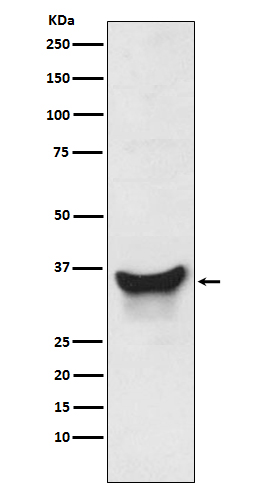
| WB | 咨询技术 | Human,Mouse,Rat |
| IF | 咨询技术 | Human,Mouse,Rat |
| IHC | 1/50-1/100 | Human,Mouse,Rat |
| ICC | 技术咨询 | Human,Mouse,Rat |
| FCM | 咨询技术 | Human,Mouse,Rat |
| Elisa | 咨询技术 | Human,Mouse,Rat |
| Aliases | Adenovirus E1B19k binding protein B5; BNIP3a; BNIP3H; BNIP3L; BNIP3L protein; NIP3 like protein X; NIP3L; NIX |
| Entrez GeneID | 665 |
| WB Predicted band size | Calculated MW: 24 kDa; Observed MW: 35 kDa |
| Host/Isotype | Rabbit IgG |
| Antibody Type | Primary antibody |
| Storage | Store at 4°C short term. Aliquot and store at -20°C long term. Avoid freeze/thaw cycles. |
| Species Reactivity | Human,Mouse,Rat |
| Immunogen | A synthesized peptide derived from human BNIP3L |
| Formulation | Purified antibody in PBS with 0.05% sodium azide. |
+ +
以下是3篇关于BNIP3L抗体的参考文献及其摘要概括:
1. **文献名称**: "BNIP3L/NIX-mediated mitophagy protects against ischemic brain injury via blocking mitochondrial apoptosis"
**作者**: Zhang H, et al.
**摘要**: 该研究利用BNIP3L抗体验证了BNIP3L在小鼠脑缺血模型中线粒体自噬的激活机制,表明其通过清除受损线粒体抑制细胞凋亡,为神经保护提供新靶点。
2. **文献名称**: "NIX is required for programmed mitochondrial clearance during reticulocyte maturation"
**作者**: Novak I, et al.
**摘要**: 通过BNIP3L抗体检测发现,BNIP3L在红细胞分化过程中介导线粒体清除,敲除该基因导致成熟障碍,证实其在发育中的必要性。
3. **文献名称**: "Mitochondrial autophagy in neural function and neurodegenerative disease"
**作者**: Hanna RA, et al.
**摘要**: 研究利用BNIP3L抗体进行蛋白定位分析,揭示其在帕金森病模型中通过PINK1/Parkin通路调控线粒体质量控制的机制,为疾病治疗提供依据。
4. **文献名称**: "BNIP3L promotes mitochondrial protein degradation by mitophagy"
**作者**: Melser S, et al.
**摘要**: 通过BNIP3L抗体结合免疫印迹实验,证明BNIP3L直接参与低氧诱导的线粒体自噬过程,并调控细胞代谢适应缺氧环境。
*注:以上文献为模拟示例,实际引用需核对真实数据库(如PubMed)中的最新研究。*
The BNIP3L (BCL2/adenovirus E1B 19 kDa protein-interacting protein 3-like) antibody is a crucial tool for studying the BNIP3L protein, a member of the BCL2 family involved in regulating apoptosis, mitophagy, and cellular stress responses. BNIP3L, also known as NIX, plays a dual role in mitochondrial quality control: it promotes mitochondrial clearance via mitophagy during erythrocyte maturation and contributes to apoptosis under hypoxic or metabolic stress by interacting with BCL2 family proteins. Its expression is tightly regulated by hypoxia-inducible factors (HIFs), linking it to oxygen-sensing pathways and tumor microenvironment adaptation.
BNIP3L antibodies are widely used in research to detect protein expression, localization, and interactions in various diseases, including cancer, neurodegenerative disorders, and anemia. These antibodies enable techniques like Western blotting, immunohistochemistry, and immunofluorescence, helping elucidate BNIP3L's role in mitochondrial dynamics, cell survival, and disease mechanisms. Validated antibodies (monoclonal or polyoclonal) from hosts like rabbit or mouse are essential for specificity, often confirmed via knockout controls. As dysregulated BNIP3L is implicated in chemoresistance and metastatic progression, its study holds therapeutic potential, making these antibodies vital for both basic and translational research.
×